#it's a whole spectrum of emotion!!! it's beautifully tragically human!!!! is that not what it is to exist!!!!
Text
idk if this makes sense. but i kind of love that the last of us makes me cry and viscerally FEEL true emotions on a weekly basis. like i cant remember the last tv show i watched that had me consistently bawling my eyes out and so immersed in a show because of the characters, the story, the incredibly strong writing, etc. and it doesn't feel manipulative. it just feels profound and beautiful and poetic but also tragic and... human.
#it's a whole spectrum of emotion!!! it's beautifully tragically human!!!! is that not what it is to exist!!!!#and it's therapeutic honestly. to spend like an hour in a world that isnt real but that you can relate aspects of your life to.#and you can just connect to these characters and their experiences and release the emotions that have been building up inside.#i'm sure that if you've played the game you feel this all the more strongly#but as someone who hasn't and went into tlou without prior knowledge#i'm just very pleased with it and idk i love watching a show that can elicit such a strong reaction from me#granted i AM what people would call 'sensitive' and 'emotional' or whatever#but even for me i dont think i've felt quite this intensely about a show - especially not right away during a first season#these are just my half baked thoughts and i definitely could say so much more but i'll leave it here for now#sameera.txt#the last of us
802 notes
·
View notes
Note
Hello! I’m your LOST secret Santa! Could you tell me about your favourite character and why you like them?
Thanks!
Hi, I'm sorry for late reply but I'm out on a trip rn!!
So, I could say that I have three fav characters; Sayid, Mr Eko and Ben.
I like Sayid bcs he's both so perfect and imperfect. He's literally the most beautiful man on the whole island who respects women and always has right opinions (let's ignore his past, okay 🤪). What is fascinating for me in his character, that I can very easily read him from his face and body language and as an autistic person, most of the time I find it incredibly hard. (Maybe it's time to slap another autism headcanon on my fav character 😆).
He's beautifully soft, caring and emotional, very intelligent and knows his shit about things. I very much have instinct to protect this man at all cost, though I know it would probably be the other way around 😆😆😆
I also very often find it fascinating when a character has a dark past although clearly being a good person and still struggling with some horrible stuff (let's ignore what they did to him in season 5/6 😭😭😭). It's like... the nuance, mixed emotions and lots of space to do some tasty psychoanalysis 👁👁 In the end, we see what his character is about and it's very much about how sOFT and caring he is to people he loves, he just wants to protect them ;u; But he was forced by war to go to extreme measures to survive and he is stuck with this survival mode and trauma for a long time, as people with pstd are.
He's a lovely friend, partner and ally to have and I like to headcanon him to be on the ace spectrum, like demisexual and biromantic (just my personal little headcanon 🤭). Idk, he's just neat 🤲💖
When it comes to Ben, I love how horrible he is, it fascinates me without the end 😆😆 He's clearly someone who has ptsd and might be autistic with some absolutely horrible coping mechanisms and jealousy problems. He's pathetic in a way that makes me hooked, whenever we find some humanity behind all of that and someone yET again gives him another chance (as they usually shouldn't, but I would do the same because I am delulu). The part in the finale in afterlife, when he was in this ridiculously adorable teachers AU with Locke made me love him even more, bcs it showed what kind of person he could be, if all of this bad stuff with island wouldn't happen. I love to headcanon him as autistic and gay aroace or asexual gay or just gay. He clearly would have many little passions if he wouldn't be occupied with the island bullshit and his ptsd. He's clearly a father at his very core, the one that is not rotten with fear and jealousy. He seems to just care sm for others in this AU. (And he clearly would have some interesting close friendship with Locke with nice sprinkle of gayness 👀)
Normally he's a horrible person with tragic story but I am a Benjamin Linus apologist 100%, love that he got his little redemption arc at the end and got domesticated by Hurley 😆 He might as well get it after all this mess and trauma with island and Jacob vs Black Smoke bullshit, like wHY not
The third option is Mr Eko and his incredibly relatable struggle with religion. Again, another character that I headcanon as autistic, like VERY much. The way he perceives world and communicates 🤌 I'm always weak for character whose stories are about survival, trauma and like in this case, religious trauma. Even though myself I came out in the end to be agnostic, I admire his strength to stay spiritual and become a priest. He's someone who's strong and someone to look up to for advice. Though, he shouldn't have to be forced to be so strong by awful trauma he went through.
I absolutely LOVED the way he perceived his spirituality and concept of sin. The way he said he asks for no forgiveness, because he only did what he did to survive. And that struck me, I was like WOAH, THAT'S IT. I am really sad that his character was killed off and we never saw where they would go with it, it would be so sO interesting. A badass priest with awfully dark past 🤌 His attachment to brother is very relatable to me too. And yet again, another aroace headcanon 😆
Anyway, sorry for long ramble, hope that helps a bit!!!
7 notes
·
View notes
Note
Give us the jessie bpd rant
JESSIE TEAMROCKET HAS BORDERLINE PERSONALITY DISORDER: A POST
[Paraphrased behaviours. I’m not a psychologist I just read the DSM-5 for fun. This is not a diagnostic tool, but if you identify with this post maybe look into some actual ones and learn some fun stuff about yourself.]
Identity problems, an unstable sense of self.
Jessie describes herself as adaptable, someone who can fit in anywhere, and this is indeed one of her strengths! She doesn’t let a lack of experience or qualifications discourage her because she believes that she can shift and change to suit her environment, and she’s right!
It’s also a major weakness of hers, though. Jessie in her element (when she’s her true self) is loud, confident, assertive, and bold. However, whenever she 'imprints’ on someone she throws her true personality aside entirely--buries it under the facade of someone who is malleable, softspoken, easy to be around, does whatever they can to make the person they love choose them. This trait of hers, and how it’s a fault, is a MAJOR plot point in XY063.
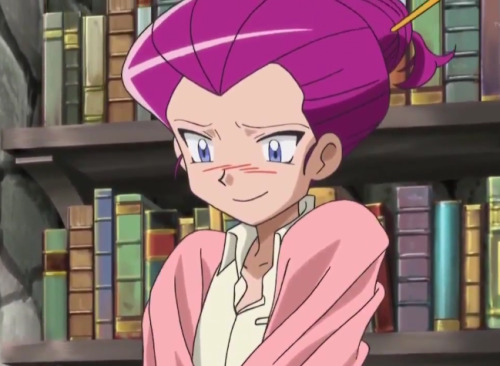
there’s a scene early on in this episode where she’s partially paralyzed from a stun spore, and Dr. White, the man who saved her from drowning, feeds her a berry to fix it. She poses triumphantly with her arms in the air and shouts ‘THAT DID THE TRICK!’ then realizes she’s being too loud around an attractive man and immediately throws her hands over her mouth, trying to stop more words from coming. It’s an incredibly effective way of showing how contradictory Jessie is when she imprints on someone. The Jessie we know would never even think of second guessing how much room she takes up in the world.
In this episode, Jessie has feelings for Dr. White, and she completely buries her personality to make herself a silent, sweet, softspoken housewife in the hopes that he’ll fall in love with her. Dr. White instead falls for his childhood friend, a loud, rude, brash girl who likes to fight, calls him a wimp and tells him to fuck off when he presses her buttons.
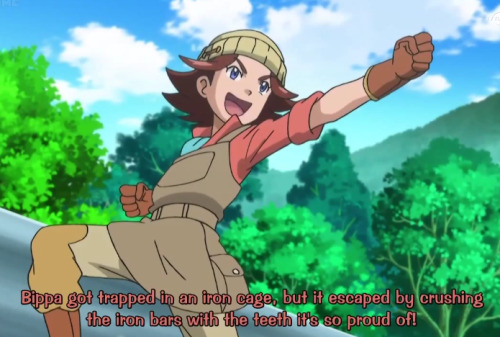

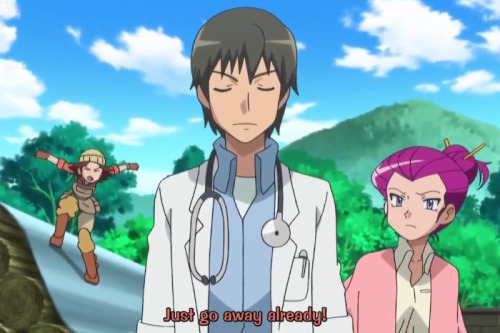
The tragedy of this episode is that Jessie is forced to confront this about herself--this way she shifts and changes to keep people near may very likely have caused her to lose something here. She’s forced to reckon with the idea that if she had just been herself, he might have loved her back. Not in spite of her personality, but because of it.
In Borderlines, this trait is often a survival mechanism, driven entirely BY:
A debilitating fear of potential abandonment, perceived or based in past trauma.
Jessie’s childhood trauma, though not often discussed, hinges entirely on her abandonment issues. She was given up to foster care around kindergarten age, which was long enough to learn to love her mother before never getting to see her again. Jessie’s implied to have been a deeply lonely child who never had a family to call her own, and who didn’t fit in with any other girls her age because she was too poor to afford even basic food and couldn’t keep up.
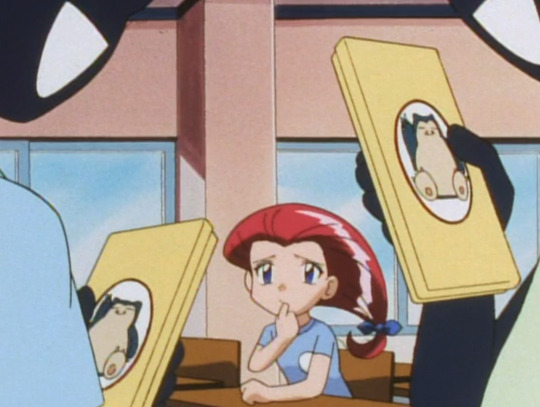
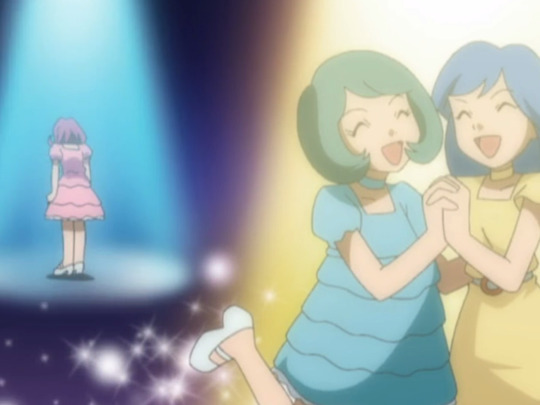
When Jessie opens up about her love life, she doesn’t go into specifics, only mentioning that it’s been full of nothing but heartbreak thus far. She’s an unreliable narrator, always, but when she’s inviting pity on herself it’s almost always manipulation to gain something, and these moments don’t seem to have that element. When she talks about her love life in EP100, it’s very carefully accented with this image:

In her adolescence, Jessie tried to center herself around her passions, pursuing them whenever she was handed the opportunity. Frequently, though, she’d find herself meeting people and growing attached to them, and would eventually reach a crossroads where she forced herself to choose between the people she cared about and the goals she chased relentlessly.
The biggest example of this is DP073, where she chooses to stay and train to be an idol, rather than to travel with the boy she’s in love with.

She ends up not passing her audition, losing both him and her shot at her career. This starts Jessie’s descent into compulsively abandoning/parting ways with everyone in her life in an attempt to control how people exit her story. The only way to prevent yourself from being abandoned with 100% certainty is, of course, to leave them before they can leave you.
This kinda blends into the next point, which is:
Instability in personal relationships.
As previously mentioned, Jessie has a tendency to leave people behind & sever ties. It’s only speculation on my part, but it would make sense that she does this because she has been left behind in so many regards and by so many people she loved, it’s the only way she feels she can take control of this phenomenon.
People who watched a lot of OS back in the day, but don’t necessarily keep up with the series much now, will famously circulate Jessie’s speech to the Ghost of Maiden Rock in EP020. The maiden was a woman who died waiting for her lover who was out at sea, and since her death her spirit’s remained on the cliffside in the hopes that he would come home. Jessie shoots the ghost of the maiden with a fucking bazooka half her height and says this:
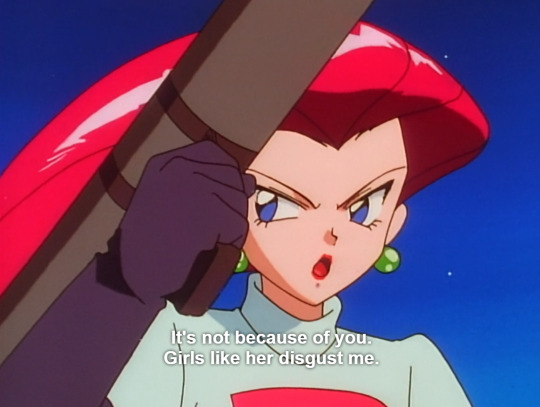
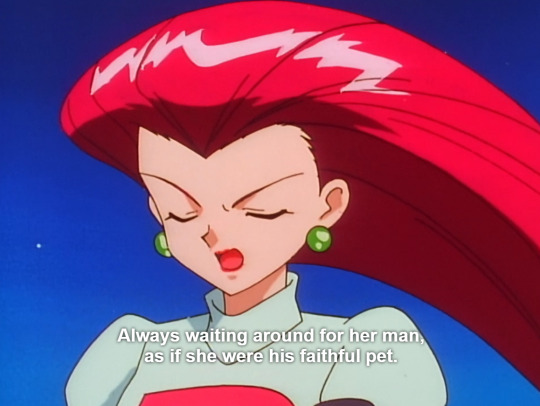
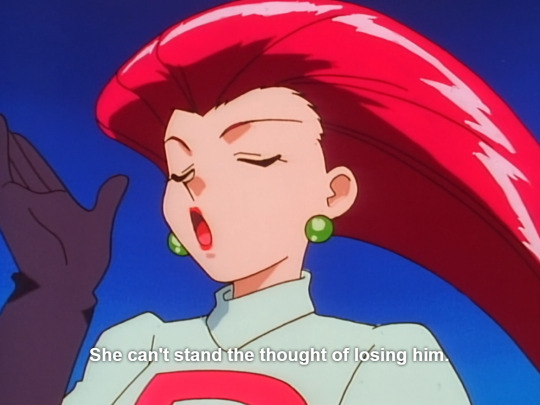
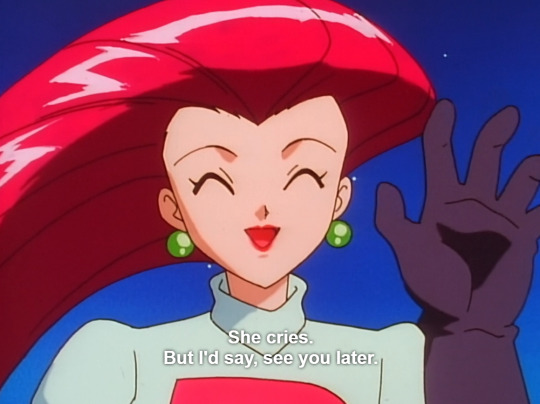
This is lauded by 90s kids everywhere as a #GirlPower speech about how Jessie don’t need no man (which is true), but it’s actually, like... kinda tragic? She hates the ghost of the maiden because she sees herself in it, and she takes the opportunity to proclaim that what she sees of herself makes her sick to look at. This speech she gives is so aggressively out of nowhere and so long and rambling that you have no choice but to read it as deeply personal. She just short of confirms that you can’t leave Jessie because Jessie leaves FIRST.
And you GET to see this in action. Jessie struggles so hard with loyalty. In ALL her relationships! Literally all of them. Every time something shakes up her foundation with a person in her life, she hardlocks herself into run run RUN mode because there’s a slight chance they might leave her and she CANNOT have that.
It was shown in the most explicit detail in the side story about what she was like in training, where Jessie’s inability to stay beside various partners in Team Rocket is literally the trait that defined her to everyone in the organization.

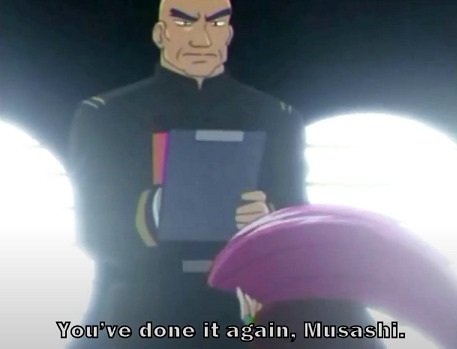
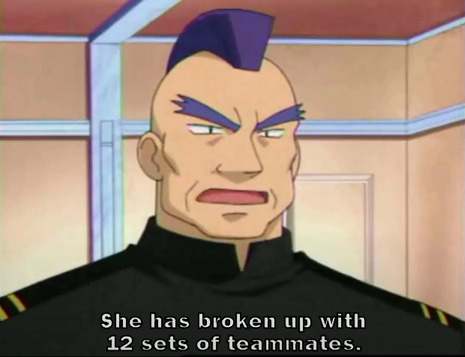

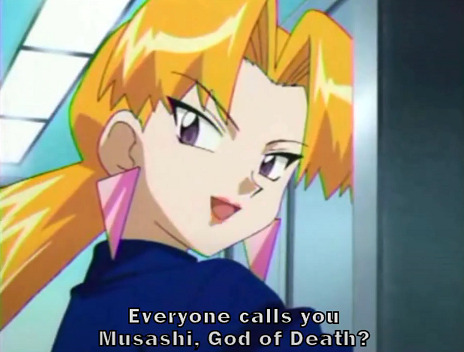
There’s even a beautifully symbolic shot in the beginning of that episode where she abandons her 12th partner, and kneels down while the world literally collapses behind her.
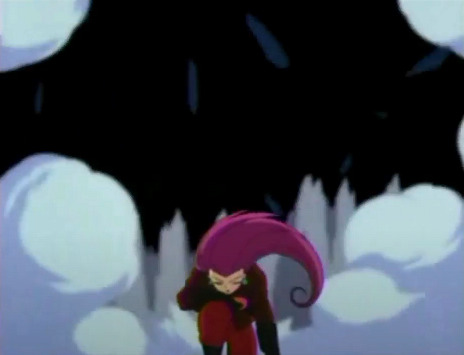
In DP073, when Jessie sees her Dustox has fallen in love with another Dustox, she demands that Dustox leave despite the pokemon hesitating. She doesn’t let Dustox control that scenario--Jessie crushes her pokeball and demands she migrate with her mate.

When Meowth dips on her and James to work food service because he finds it more rewarding, Jessie doesn’t try to fight it, instead focuses her energy on also leaving her teammates in her dust because at least she can get out of there and move on before James abandons her.
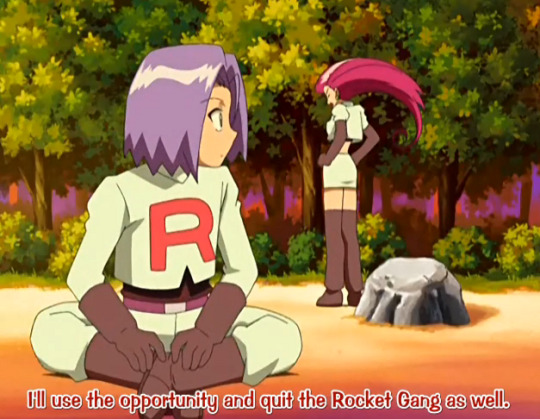
When she realizes White loves another girl, she doesn’t bother to even say goodbye to him, she just leaves wordlessly with nothing in her wake but a bouquet of daisies, and when she remembers that oh right, her wobbuffet is also in love with White’s own--

She tries to leave him, too.
You can’t fire Jessie. Jessie quits.
This is the in-depth, analytical part of me Diagnosing Her. Everything else she exhibits is far more General and really doesn’t need a trained eye:
Instability in one’s goals, aspirations, or career: Jessie has a steady job in Team Rocket, but is constantly picking up side-hustles and being distracted by passions like acting, performing, contests, and the like. She’s left Team Rocket entirely before to pursue Contests, only to return almost immediately. (DP117)
Difficulty controlling the range/intensity of one’s emotional responses: Long past the Slapstick Days of the original series, Jessie’s still incredibly prone to outbursts. It’s not just anger--she reacts equally strongly when she’s sad, happy, lovestruck, anything. I have used this exact phrasing before, but Jessie doesn’t feel her emotions, she becomes them.
Poor impulse control: Kind goes hand-in-hand with the above.
Engaging in dangerous/risky/self-harming activities with no concern to personal limitations: This applies to all of Team Rocket, but Jessie seems to take it a step further in thinking she’s invincible. She’ll throw herself headfirst into anything, rarely backs down from a fight, and often has trouble taking rest days even when she needs them because she lacks self-preservation.
Hair-trigger temper: lol yeah.
Unstable emotions/mood swings: lol YEAH, Jessie will be crying one minute, screaming the next, immediately fine. She can cycle the whole spectrum of human emotion before you can finish a sentence.
Idealization & Imprinting: Jessie frequently rushes into relationships based entirely on the idea of a person, not grounded in reality. She becomes attached to people incredibly easy at times, willing to throw her entire life thus far away to run away with someone she’s just met.
Living entirely in the moment, unable to comprehend the past/future: Jessie prefers to go with the flow and, as previously mentioned, adapt if things don’t turn out in her favour. If something doesn’t work out for her, she immediately will turn in the other direction and start toward whatever’s there.
This post is so long and I could probably make it longer but I’m gonna stop here. My credentials are I’m an Incredibly Powerful Jessie Kinnie who has BPD herself as well as an autistic who’s special interest is the pokemon anime and team rocket specifically fdhdfghg.
IN CONCLUSION,

#long post#wendy rambles#pokemeta#im actually done apologizing for putting long fucking posts on your dash#oh god i have to source this#ok um#os#ag#dp#xy#ep020#ep100#ep224#hs012#dp073#dp117#xy063#shinxchu#wendy answers#this is an ask but tumblr's formatting is fucking up rn???
206 notes
·
View notes
Text
Amanda Palmer Interview: There Should Be No Misinterpretation

Photo by Kahn & Selesnick
BY JORDAN MAINZER
“No one’s gonna tie surprise balloons / Onto your desk at work / And no one’s gonna ask how you’re doing,” Amanda Palmer sings on “Voicemail for Jill”, a standout track on her new album There Will Be No Intermission. She’s talking to a friend about an abortion, something you think may be the case throughout the song but that’s--importantly--revealed explicitly at the end. As someone who has had three abortions herself, Palmer didn’t wish to steep the subject in wink-and-nod metaphor or any sort of ambiguity. Let’s just talk about it, she’s arguing.
This lack of grey area exemplifies the album as a whole, a stark affair consisting of mostly Palmer and piano, alternating between long, but structured tales and instrumental interludes. The subject matter of the songs isn’t necessarily tragic, if something has to achieve a certain level of rarity to be considered tragic. Rather, they’re common even if not part of every life--miscarriages, cancer, and abortions--and as such deserve to have their stigmas eliminated, something Palmer helped to do the best way she knew how: by writing songs. Likewise, the live tour accompanying the record will be similarly minimal, Palmer’s voice and a couple instruments the vessels for telling vital stories.
Last month, I interviewed Palmer over the phone (in preview of her show at the Chicago Theatre next Friday). In addition to talking about Intermission and “Voicemail for Jill”, she spoke about working with John Congleton and crowdfunding using Patreon. Read our conversation below, edited for length and clarity.
Since I Left You: How is the new record unique as compared to anything else you’ve ever released?
Amanda Palmer: It’s the most direct, for sure. [laughs] There’s not a whole lot of room for interpretation or misinterpretation, although I’m sure there will be plenty of people out there who try to misinterpret it. It’s about as forthright as my songwriting has ever gotten, and it’s certainly the most therapeutic record I’ve ever made. I’ve made some therapeutic records, but this one takes the cake.
SILY: Would you say that whatever ambiguity there is, it might lie in the perspective from which you’re singing?
AP: You know, I don’t know. I always think my songs are easier to figure out than other people do. A lot of these songs are just very direct storytelling. They don’t leave a whole ton up to the imagination. And that’s really deliberate. I didn’t want to couch these experiences in a whole lot of metaphor for a reason. It felt like I could do a better service to the world and to the sorts of people who will probably listen to my music who are already collected if I didn’t take the easy way out and didn’t decorate these subjects. That’s reflected in the record cover. It’s a very blunt, naked record.
SILY: That doesn’t mean that you can’t toy with different modes of storytelling. A song like “Voicemail for Jill” has that very explicit reveal in the end about the abortion shower. Do you think you were still able to change up the way you told the stories?
AP: That’s such a great question because I struggled for so, so many years trying to figure out how to write about abortion. The place I would always get really tripped up when trying to sit down to write about that subject was I just couldn’t figure out who was talking. For a subject as dicey and as personal as abortion that’s at once completely intimate and heavily political, I just couldn’t find a voice who was inarguable. I needed to somehow find that. It took me a really, really long time, and I always had a pot on the back-burner of my songwriting brain trying to figure out how to write a really, good, solid, unsentimental abortion song. Interestingly enough, it was finally landing on a perspective that worked for such a powerful and obvious reason, which we’re seeing reflected in all of the movements that are springing up right now, which is a woman telling the truth to another woman. Shamelessly.
SILY: A line that sort of sticks out to me--and maybe it’s no coincidence it becomes at the beginning of the record--is, “Isn’t it nice when we’re all afraid at the same time?” Is that solidarity in fear a very important theme of the record?
AP: I think that’s a question for you. [laughs] I think that’s why we make art. We don’t want to feel alone. That’s why we make it and why we listen to it and look at it. It’s why we continue to need it. Art does something that nothing else can really do. It doesn’t matter how educated you are. It doesn’t matter what your human experiences have been. It doesn’t matter what you believe. There’s this incredible core truth that art can bypass all of these systems and give a shared human experience that nothing else can give us. This record for me feels like my most direct contribution to that pile of stuff.
SILY: I want to switch gears to the structure of the record. It switches between stories and interludes, or short instrumental bits. The title was named after one of these instrumentals. Obviously, people are going to concentrate more on the words of the longer songs. But what’s the importance of the shorter, in-between tracks to you?
AP: They’re strategic breaks so that you can get more wine and Kleenex. [laughs] They’re there to give you a breather and also thread the record together so it feels like one album instead of a bunch of random fragments.
SILY: Is this the second album you’ve crowdfunded?
AP: Kind of. It’s interesting. Nobody has said that before. This record wasn’t really crowdfunded. You can look at it either way. It was either entirely crowdfunded because my entire life right now is crowdfunded, or it wasn’t because I didn’t use Kickstarter and I didn’t raise funds for this one standalone album. I’m using Patreon now, so everything in my life is crowdfunded from the album to the salary that I pay my assistant to the bananas I bought this morning for my kid. It’s all crowdfunded. And I love it that way. My audience has put in an immense amount of trust in me, and I pick my Patreon salary every month and spend it on the entire work of my life, which is the cost of this album and a huge studio in L.A. and a string section and producer and the mastering and the artwork. It’s endless. There has never been less of a beginning and end as far as that kind of stuff is concerned. My art and life and business has achieved a complete figure 8. I love it. It’s working beautifully.
SILY: It’s almost a model for other people to follow themselves if they see it working for you.
AP: Yeah, they are slowly, but I’m still an early adopter, and I’m also a weird kind of unicorn because I really deeply love being in constant touch with my audience. I love sharing my process. I love having very few boundaries between my so-called personal life and my work. And that makes it much easier for me to jump the crowdfunding hurdle. It doesn’t mean that it’s impossible for very very private artists to stand up and say, “I’m fucking sick of the major label system; all I want to do is put out a record every five years. Will you promise to contribute 25 bucks every time that happens?” The PJ Harveys and the Jeff Mangums of the world are perfectly capable of doing that and would probably be showered with hundreds of thousands of dollars. But there’s still a real emotional stigma around the idea of going directly to your audience instead of going up to the head office of a label.
SILY: Is this your second record working with John Congleton?
AP: Yeah. He’s my soul brother. There was nobody else I wanted to make this record with.
SILY: What does he bring to your creative process that’s unique and continues to help you grow?
AP: He brought two essential things to this record--and I’m so glad you asked, because you’re the first journalist who’s asked about John, and he deserves a lot of credit for this record. First of all, he and I have a rapport personally with one another which was an essential ingredient of an ability to go into a studio, sit behind a piano, and do this kind of material. There was no fucking way I was going to go into a studio and do this with a stranger. I had to be with a friend. It was just a non-starter. And John and I haven’t just worked together--we’ve worked together and have become friends. That was important. I needed to go in that studio and feel completely safe. To cry, to be frustrated, to feel completely un-self-conscious. I knew John could allow me that space and help create a harbor that I could dock in and do whatever it was I needed to get wherever I needed to get to make an album this honest. It's important to point out that there was nobody else in the studio. There wasn’t an assistant engineer. We locked the doors. It was just me and him. And mics and instruments. Later, we had lots of people coming in and doing overdubs, but when we were doing basic tracks, it was a lockout.
The other thing was everything added to the record beyond the basic tracks. John and I had a really strategic, deliberate approach to how we wanted this record to sound. I have made records with full orchestration, full 30-piece orchestra with strings sections, full bands, full kicks, full everything. And I’ve also made a bunch of music with the Dresden Dolls. I’ve experienced the whole spectrum at this point of what you can and can’t do when you’re starting with a piano song. John and I discussed this over email and over the phone for a year. What we agreed on was that the album needed extra ornamentation, but it needed to be extremely minimal and it needed to have rules. We were going to create that set of rules and then stick to them like our lives depended on it. The rules were: No band, no strings, anything else goes. I trusted John. He hired Max Henry from the band Suuns from Montreal to fly out to L.A. to experiment with me in the studio to program and create extra sounds. My really good friend Jherek Bischoff, who orchestrated the last record, came in and did really minimal upright bass overdubs. We prepared the piano and he created all of those intermissions. That was it. And there was one other, Joey Waronker who played drums for about 25 seconds. He was off tour for two days and was like, “Sure, I’ll play drums.” Jason Webley played some accordion on “Mother’s Confession”. That was it. If you’re a music geek and really care about production, all of our choices in terms of the overdubs or adding extra vocals were super careful and very deliberate. Anything that didn’t support the story was jettisoned. We ended up leaving a lot on the cutting room floor. We were trying to leave with the most tasteful, minimal sound we could achieve.
SILY: How are you adapting this album to the live stage?
AP: Solo. [laughs] It’s just me, a piano, and a ukulele, and that’s it. There’s no support. No special guests. I’m not fucking around on this tour. I’m just getting on stage and delivering a really meticulous, powerful show.
SILY: Do you find it weird doing that in big theaters?
AP: Well, I have to do that in big theaters because even though I would probably prefer to do this in 300-seat clubs, I don’t want to tour this record for 5 years. I can sell about 2,000 tickets per city. Unless I wanted to tour this record every night in every city for 8 nights, I needed to play large theaters. But they’re not so large that they can’t feel intimate. I think it’s gonna work. And that’s part of the challenge. It’s a lot easier to play to a room of 300 people and make it feel totally fucking real. It’s harder to do when you’ve got 2,000 souls in a room. I think I’ve figured it out. Check back in with me in a couple months.
SILY: You’re playing the Chicago Theatre on your tour, and I think it definitely fits that description.
AP: Yeah. And you know, I watched Nick Cave play Skeleton Tree to a room of, I don’t know, 7000 people in Sydney. And he pulled that off. And I thought, “If he can pull that off, I can pull this off.”
SILY: Do you have a favorite song on the new record?
AP: Yeah, I think I do, but I think it’s gonna keep changing. [laughs] Right now it’s “Voicemail for Jill” because I’m putting it out tomorrow. I’m surrounded by it. I’m really really attached to and proud of all of the material on this record in a way that I never have been before. Unabashedly. But this song and what it means and what it says, it’s like if you held a gun to my head and said, “Okay, you can put out only one of these in the world,” that’s the one I would pick. As a survivor, that’s what I would stick in the life raft when escaping from a sinking Titanic. That’s the song that may help and heal the greatest number of people. That’s the one I’d give my organs to.
#amanda palmer#interviews#Kahn & Selesnick#john congleton#max henry#jason webley#chicago theatre#there will be no intermission#kickstarter#patreon#pj harvey#jeff mangum#the dresden dolls#suuns#Jherek Bischoff#joey waronker#nick cave#skeleton tree
0 notes